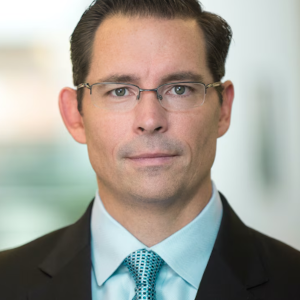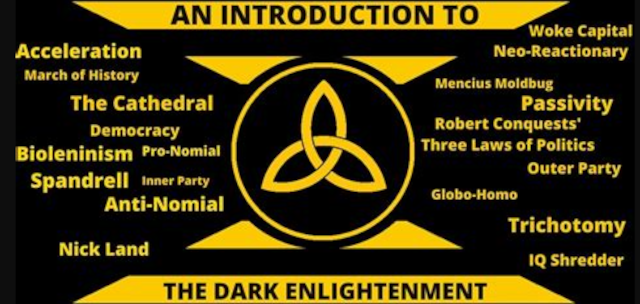In this article we are going to explore “accelerationism” and its roots in “the Dark Enlightenment.” We need to do this because, surprisingly, a commitment to accelerationism—following the philosophical path laid by the Dark Enlightenment—is a powerful influence on both the left and the right of the political spectrum. In order to examine these ideas, we need to pick apart some pretty impenetrable texts, and this won’t be easy. So, if you are ready to start wrestling with some quite alien and seemingly bizarre concepts, read on.
The term “accelerationism” first mentioned in the 1967 sci-fi novel Lord of Light by Roger Zelanzy, was regularly applied in economics during the mid-1970s. It has enjoyed a resurgence since 2010, when it began to be used in the sense of hastening the onset of technosociety. Its new coining is attributed to Benjamin Noys, an English professor of Critical Theory.
It is in that latter usage, just a decade old, that I use the term in this article. So, it has come as a bit of shock to discover that accelerationism is already seemingly everywhere. Indeed, accelerationism has apparently been adopted by many of the most powerful people and institutions on the planet. It is widespread and influential.
When the World Economic Forum signed its Strategic Partnership with the United Nations, it claimed that the purpose was “to accelerate the implementation of the 2030 Agenda for Sustainable Development.” In his 2021 letter to shareholders, BlackRock CEO Larry Fink referred to “acceleration” seven times.
Three examples:
- “the pandemic has also accelerated deeper trends”
- “the reallocation of capital accelerated even faster than I anticipated”
- “momentum continues to build, and in 2021 it will accelerate—with dramatic implications for the global economy.”
The UK Government has numerous policy Accelerators, and politicians often talk about accelerationism. In his statement on the alleged British economy’s growth plan, the former Chancellor of the Exchequer (UK Finance Minister), Kwasi Kwarteng, said:
[W]e are publishing a list of infrastructure projects that will be prioritised for acceleration[.] [. . .] I can announce that we will accelerate reforms[.] [. . .] We will liberalise planning rules in specified agreed sites, releasing land and accelerating development [. . .] for ten years, there will be accelerated tax reliefs for structures and buildings.
During the pseudopandemic, the World Health Organisation established its Access to COVID-19 Tools (ACT) Accelerator. The UK Ministry of Defence established its Defence and Security Accelerator (DASA) in 2016 as a public-private partnership for the “exploitable innovation” of defence technology.

Speaking in 2020, Joseph H. Davis, Chief Economist for the global investment giant Vanguard, wrote an article, pre-empting Fink’s sentiments, discussing how “the pandemic has accelerated some trends already in place.” In a section he entitled The Future Accelerated, he wrote:
[T]he pandemic functioned as a call option on employers’ incrementalism. No longer could work-from-home arrangements serve as controlled experiments in productivity; they became indispensable. Ready or not, employers for the most part have successfully enabled secure and efficient work from home and redefined team dynamics. [. . .] COVID-19 has also accelerated the challenges facing restaurants and brick-and-mortar retailers. E-retail and food delivery, already growing in popularity before the pandemic, have become essential to consumers worried about face-to-face interaction.
Davis’ statement reveals a bit more about this notion of accelerating. Most of us think of it as the present participle of the verb “accelerate”; simply an adjective to describe a change in velocity and little more. But Fink and Davis appear to be among those who ascribe a different meaning to the notion. “Accelerating” to them also implies disruption; a catalyst for change accomplished in leaps and bounds rather than by steady progress.
When we then discover that “accelerationism” is a distinct socio-political philosophy, it is reasonable to ask whether all of these “accelerators” are, in fact, based upon an ideology. Is there more to this concept of “acceleration” than meets the eye? Does use of the term by people like Schwab, Fink, Davis, and Kwarteng mean more than just “quicken”?
The Accelerationist Left
In his useful exploration of accelerationism, the Guardian’s Andy Beckett outlined the core beliefs of its exponents, the accelerationists:
Accelerationists argue that technology, particularly computer technology, and capitalism, particularly the most aggressive, global variety, should be massively sped up and intensified [. . .]. Accelerationists favour automation. They favour the further merging of the digital and the human. They often favour the deregulation of business, and drastically scaled-back government. They believe that people should stop deluding themselves that economic and technological progress can be controlled. They often believe that social and political upheaval has a value in itself.
He also provided his view of what accelerationism is not:
Accelerationism, therefore, goes against conservatism, traditional socialism, social democracy, environmentalism, protectionism, populism, nationalism, localism and all the other ideologies.
Beckett wrote about the activity of radical accelerationists at the the Cybernetic Culture Research Unit (CCRU) of Warwick University during the mid-1990s. It would be easy to discard the drug-fuelled musings of these cyber-punk iconoclasts, seeking as they did to deconstruct everything, from politics and society to economics and philosophy, as little more than nihilistic navel-gazing. That would be a mistake.
It is evident that the ideas of CCRU “thought leaders” like Professors Sadie Plant and Nick Land have gone on—thanks largely to those who have continued to promote them, such as Mark Fisher and Alex Williams—to have a profound impact upon global policy agendas. While often this association goes undeclared and unnoticed, accelerationism pervades, as we shall see, the strategic planning of the globalist think tanks and those who form them.
Accelerationism has been attacked by some for being on the political right, an expression of “popularism” favoured by the so-called “alt-right” or even by the “far right.” We will explore the reasons why in a moment. Yet it has also been picked up by the left, especially what we might call the environmentalist left, thus somewhat contradicting Beckett’s observation.
In 2013, in the wake of the 2008 global financial crisis and building upon the work of the CCRU, Canadian academics Alex Williams and Nick Srnicek wrote the Accelerationist Manifesto. The Manifesto declared that the authors’ interpretation of accelerationism was the only feasible response to what they called the “breakdown of the planetary climatic system”:
[T]oday’s politics is beset by an inability to generate the new ideas and modes of organisation necessary to transform our societies to confront and resolve the coming annihilations. [. . .] We believe the most important division in today’s left is between those that hold to a folk politics of localism [. . .] and those that outline what must become called an accelerationist politics at ease with a modernity of abstraction, complexity, globality, and technology. [ . . .] [A]n accelerationist politics seeks to preserve the gains of late capitalism while going further than its value system, governance structures, and mass pathologies will allow. [. . .] The choice facing us is severe: either a globalised post-capitalism or a slow fragmentation towards primitivism, perpetual crisis, and planetary ecological collapse.
Williams and Srnicek claimed that there was no option but to act towards achieving “globalised post-capitalism.” They saw accelerationism as key to saving the planet but were also opposed what they identified as the accelerationism of the neoliberal hegemony:
If any system has been associated with ideas of acceleration it is capitalism. [. . .] In its neoliberal form, its ideological self-presentation is one of liberating the forces of creative destruction, setting free ever-accelerating technological and social innovations.
They suggested that Schumpeter’s “creative destruction” was purposeless unless the “post-capitalist” direction was clearly defined. “Neoliberal accelerationism,” they said, was nothing but a “brain-dead onrush.” Instead, accelerationism should be “navigational” and based upon an “experimental process of discovery.” Therefore, the problem was the misinterpretation of accelerationism by the right-wing, capitalist neoliberals.
Williams and Srnicek urged that the Left’s response to this should not be to discard, but rather to adapt what they claimed to be the unavoidable economic forces and political philosophies that were inextricably embedded within modernity, including neoliberalism:
Accelerationists want to unleash latent productive forces. In this project, the material platform of neoliberalism does not need to be destroyed. It needs to be repurposed towards common ends. The existing infrastructure is not a capitalist stage to be smashed, but a springboard to launch towards post-capitalism.
Like all accelerationists, the pair placed great emphasis on digital technology and, in particular, on computer modelling:
Economic modelling is — simply put — a necessity for making intelligible a complex world. [. . .] The tools to be found in social network analysis, agent-based modelling, big data analytics, and non-equilibrium economic models, are necessary cognitive mediators for understanding complex systems like the modern economy. The accelerationist left must become literate in these technical fields.
As society must be transformed to avert a climate catastrophe, the pair said that the “transformation of society must involve economic and social experimentation.” This would enable the left to create a “sociotechnical hegemony” that would reprogramme “production, finance, logistics, and consumption” to be “reformatted towards post-capitalist ends.”
The gargantuan effort of transforming everything could not be achieved by any one nation state, multinational corporation, or population. Everyone with sufficient means must be involved:
What is needed — what has always been needed — is an ecology of organisations[.] [. . .] A positive feedback loop of infrastructural, ideological, social and economic transformation, generating a new complex hegemony, a new post-capitalist technosocial platform. [. . .]
[T]he accelerationist Left must think more seriously about the flows of resources and money required to build an effective new political infrastructure [. . .] whether from governments, institutions, think tanks, unions, or individual benefactors.

The modern architects of the New Left, whose ideas are expressed through people like Paul Mason and Aaron Bastani, have become increasingly uncomfortable with the term “accelerationism.” This perhaps partly explains why Andy Beckett claims it is absent from “environmentalism [. . .] and all the other ideologies.”
Paul Mason—widely thought to be a state intelligence asset—in particular, rails against what he sees as the anti-human elements of the “sociotechnical hegemony.” Instead, he advocates his concept of the “networked individual,” liberated by technology but not exploited by it.
Williams and Srnicek have also distanced themselves from, and now even refuse to mention, accelerationism. Yet all of these left-leaning thinkers have clearly incorporated many of the central tenets of accelerationism in their work.
Employment will in their vision be replaced by technology, as human beings live by means of some form of Universal Basic Income (UBI.) The traditional class structure will become irrelevant; consequently, the class struggle is rendered meaningless. Class inequality will dissolve, to be replaced by a metropolitan monoclass of intellectually and creatively free individuals, all benefiting from an equitable redistribution of resources, as capitalist “wealth” and “property” become anachronisms.
All of this will be to the benefit of the general good, enabling society as a whole to avert “the coming annihilations.” An AI-driven technological utopia is possible, we are assured, as we make the necessary and inescapable adaptations. There will be no scarcity and no need for the acquisition of additional means.
As Paul Mason wrote, “information technology makes Utopian Socialism possible.” We will own nothing and we will be happy. Others of this persuasion have called the vision “the Conquest of Bread,” “fully automated luxury communism,” or “luxury communism now.”
To be fair to the accelerationist left, they are not suggesting that the envisaged utopia will just happen. They concede that the political and regulatory environment must be conducive to the creation of the post-capitalist society. They must be delighted that it very obviously is.
So why, having resurrected the fringe philosophy of the CCRU, are they so squeamish about the ideology underpinning their own current worldview—the more so, given that their dream of an accelerationist transformation is underway?
The Accelerationist Right
The post-capitalist left’s collective shyness about openly acknowledging its accelerationist roots appears to be based upon its adherents’ intense dislike for those whom they consider their enemies. They have not abandoned accelerationist principles; they just despise the other people who have also adopted them, and therefore pretend that they aren’t on the same trajectory.
In 2009, Peter Thiel, the billionaire venture capitalist of PayPal and Palantir Technologies fame—or infamy, depending on your perspective—whose connections to the intelligence agencies and the deep state and the Republican Party in the US are multifarious, wrote the book The Education of a Libertarian. In the wake of the financial crisis, Thiel’s opinion was that the prospect of achieving the libertarian goal of a free market was “grim indeed” and that trying to win over “the body politic” was a “fool’s errand.”

Thiel said the US financial crash of 1920–1921 was the last time that government had not stifled Shumpeter’s creative destruction. Thiel believes that a sharp deflationary recession is a good thing. He claimed that the roaring economic decade of the 1920s was the result, though notably not the 1929 Wall Street Crash it ultimately produced.
He said that ever-increasing government intervention would bring about a totalitarian catastrophe, and called the notion of capitalist democracy an “oxymoron,” adding that “social democracy” was the product of an “unthinking dēmos.” Since, in his view, both democracy and politics had failed completely, he concluded that “the great task for libertarians is to find an escape from politics in all its forms.“
In 2012, Nick Land, the former CCRU head, published his sprawling treatise on accelerationism, The Dark Enlightenment. Arguing that the process of “enlightenment” is built upon supposedly “self-evident” concepts which, once discovered, can never be cast off, Land suggested that an inescapable socio-political “vector” results. He opined that, while people may benefit from the associated “progress,” the destination of the process of enlightenment is “a new dark age.”
If we know that the vector is terminal, the only logical position, Land asserted, is to react against the alleged illumination of democratic progress:
Democracy’s relentless trend to degeneration presents an implicit case for reaction.
The “neoreactionary” (NRx) has to pursue the lessons of the Dark Enlightenment in the hope of breaking free from the inexorable path towards “totalitarian catastrophe.” Picking up on Thiel’s ideas, and calling their expression a “milestone,” Land writes:
For the hardcore neo-reactionaries [NRxs], democracy is not merely doomed, it is doom itself. Fleeing it approaches an ultimate imperative. The subterranean current that propels such anti-politics is recognizably Hobbesian, a coherent dark enlightenment, devoid from its beginning of any Rousseauistic enthusiasm for popular expression.
The Dark Enlightenment rejects the “social contract” because that alleged agreement condemns everyone to “democratic politics.” This can only ever deliver a “sovereign power” that runs the “democratic state” for its own ends, at everyone else’s expense. The only “democratic” mechanism, along the vectored path, is politics, which is itself leading all of us to our “doom”:
[T]he dynamics of democratization [are] fundamentally degenerative: systematically consolidating and exacerbating private vices, resentments, and deficiencies until they reach the level of collective criminality and comprehensive social corruption. The democratic politician and the electorate are bound together by a circuit of reciprocal incitement, in which each side drives the other to ever more shameless extremities of hooting, prancing cannibalism, until the only alternative to shouting is being eaten.
Land was here expanding the ideas enunciated by the software engineer and internet entrepreneur Curtis Yarvin, who wrote under the pen name of Mencius Moldbug. As Moldbug, Yarvin started writing his various “unqualified reservations” in 2007. In 2013, Yarvin (alias Moldbug) received start-up funding from Peter Thiel for Urbit, his decentralised peer-to-peer (P2P) network technology company.
Thiel, Yarvin and Land are among many who believe that “sovereignty” is solely defined by political power exerted over others. Consequently, Land claims that such sovereignty “cannot be eliminated, caged, or controlled.” The monetary power of supreme capitalists is also an unavoidable reality, and therefore the task is to identify “who[m] capitalists pay for political favours.” This so-called “mapping” of real power will enable clarification of the “ruling entity” that comprises the “truly dominant instance of the democratic polity.”

The “dominant instance” is therefore considered by those of the neoreactionary persuasion to be an amalgam of a malleable “democratic” polity with a corrupting element of private capital. This dominant instance is infused with an unimpeachable morality, founded upon the universal “progressive” truths of the prevailing “democracy.” Yarvin declared that this socio-political structure expressed itself through “the Media-Academic complex,” creating an invincible “ruling entity” he called “the Cathedral.”
Yarvin suggested that an account of the Cathedral should be made by quantifying its “administrative, legislative, judicial, media, and academic privileges.” These elements could then each be given a monetary value and subsequently “converted into fungible shares.” He named the process “neo-cameralisation” (meaning reorganising the chambers).
Thus understood, the Cathedral could eventually be transformed into a corporate structure called “gov-corp.” This would be owned by capitalist stakeholders and run as a business:
[I]t is essential to squash the democratic myth that a state ‘belongs’ to the citizenry. The point of neo-cameralism is to buy out the real stakeholders in sovereign power, not to perpetuate sentimental lies about mass enfranchisement. [. . .] Once the universe of democratic corruption is converted into a (freely transferable) shareholding in gov-corp, the owners of the state can initiate rational corporate governance.
According to the accelerationists, the Cathedral is infested with a postmodern “central dogma” affording misplaced but “absolute moral confidence.” Consequently, nothing is more intolerant of dissenting views or less inclusive: the “secularised neo-puritanism of the Cathedral” deifies the “evangelical state” and all opposition to it is heresy.
Land dubbed the widespread, societal acceptance of this supposedly irreproachable, postmodernist certainty “Modernity 1.0.” He contended that the economy underpinning this “evangelical” society must rely upon economic growth, which always exceeds population growth. Therefore, Land says, the Cathedral is an inherently destabilising and self-contradictory force.
The technological capacity “accelerating development” does provide the necessary growth, but it is then almost entirely consumed by “the rent-seeking special interests” of the extant Cathedral. The fruits of that growth are swallowed by the stakeholders before anyone else gets a taste.
As this destruction is mindlessly tolerated by the neo-Puritans’ faith in Cathedral democracy, Land described this sickness as “demosclerosis” (the hardening of the masses so that they are incapable of accepting change). He claimed it was a fatal condition. Offering some predictions on where all this is heading, starting with his concept of “postmodernity,” he wrote:
Postmodernity. Amounting essentially to a new dark age, in which Malthusian limits brutally re-impose themselves, this scenario assumes that Modernity 1.0 has so radically globalized its own morbidity that the entire future of the world collapses around it. If the Cathedral ‘wins’ this is what we have coming.
Realistically, for the Cathedral to continue enjoying the fruits of its democracy, its current stakeholders must consume ever more. Land envisaged that they would have to move beyond Modernity 1.0, spreading their gluttony globally.
Land identified the opening-up of China as key to preserving the stakeholders’ feeding frenzy. In 2012, he predicted that Modernity 2.0 would be based upon the necessary dissolution of the pax Americana world order, thereby inviting other states to the dining table. This would defuse Anglo-American power but would also transmit demosclerosis to others:
Modernity 2.0. Global modernization is re-invigorated from a new ethno-geographical core [the East], liberated from the degenerate structures of its Eurocentric predecessor, but no doubt confronting long range trends of an equally mortuary character. This is by far the most encouraging and plausible scenario (from a pro-modernist perspective), and if China remains even approximately on its current track it will be assuredly realized.
For the accelerationists, the Dark Enlightenment offers a would-be solution. As Modernity 1.0 and 2.0 are understood only to be heading towards the same point of annihilation, with the 2.0 iteration simply kicking the can further down the road, Schumpeter’s creative destruction (a term also bandied about in Britain’s misnamed Conservative Party) should be accelerated and propelled to brutal heights in order to smash the Cathedral to pieces. Like the short, sharp shock of the 1920 financial crash as set against the prolonged agony of the post-1929 Depression, this, it is held, will be preferable to the slow, drawn-out suffocation of Modernity 2.0.
According to Land, a subsequent “Western Renaissance” will then be born:
Western Renaissance. To be reborn it is first necessary to die, so the harder the ‘hard reboot’ the better. Comprehensive crisis and disintegration offers the best odds.
The darkly enlightened accelerationists acknowledge that the deeply entrenched self-interest of the Cathedral stakeholders renders the “vector” immovable. Only the Cathedral’s final implosion enables gov-corp to facilitate Western Renaissance:
[I]t’s already absolutely clear that none of this is going to happen short of an existential civilizational cataclysm. Asking politicians to limit their own powers is a non-starter, but nothing less heads even remotely in the right direction.
Therefore, the committed neoractionary should take a pragmatic view and hasten the Cathedral’s demise:
Because competition is good, a pinch of Western Renaissance would spice things up, even if — as is overwhelmingly probable — Modernity 2.0 is the world’s principal highway to the future. That depends upon the West stopping and reversing pretty much everything it has been doing for over a century, excepting only scientific, technological, and business innovation.
Thus, the only part of Western civilisation that the neoreactionary considers worthy is its “scientific, technological, and business innovation.”
It is with the proposed solutions revealed by the advocates of Dark Enlightenment that things start to become very “dark” indeed.
In the task of mapping “sovereignty” in order to evaluate the Cathedral and assign a share price to its functions, the population is practically irrelevant:
Insofar as voters are worth bribing, there is no need to entirely exclude them from this calculation, although their portion of sovereignty will be estimated with appropriate derision.
The Dark Enlightenment logically advocates that the “owners of the state” are those who already have sufficient means to “buy out” the Cathedral’s “stakeholders.” While Land stops short of saying so, this implies that the current “stakeholders,” through neo-cameralisation—the “formalization of political powers”—will simply become the major “shareholders” of the Western Renaissance delivered by gov-corp.
Thiel’s “unthinking dēmos,” who aren’t worth bribing because their share of sovereignty is derisory, simply become the “not very bright” customers of gov-corp. Land asserts that gov-corp would be an improvement upon destructive democracy because the primary business of this corporate state would be to maximise collection of “sovereign-rent” (taxation) from gov-corp’s dullard customers (the population):
Gov-corp would concentrate upon running an efficient, attractive, vital, clean, and secure country, of a kind that is able to draw customers.
The customer, then, is an NPC (non-playing character) whose only purpose is to act as a cash cow—although money won’t exist—for the neoreactionary shareholders (stakeholders) of global gov-corp. The Dark Enlightenment promises that we can “become intelligible” once we are “subsumed into the technosphere, where information processing of the genome — for instance — brings reading and editing into perfect coincidence.”
As “technoplastic beings” (meaning entities capable of being reformed by technology), in a world where “biology and medicine co-evolve,” we can all prostrate our children before gov-corp as we collectively undergo “precise, scientifically-informed transformations.” When we cross the “bionic horizon,” we can finally kill God and abandon the “essence of man as a created being” as we sacrifice our humanity to embark upon our “new evolutionary phase.”

The Accelerationist Pragmatists
As published political philosophies go, the prophecies of the Dark Enlightenment and the theories of the post-capitalist Socialist Utopians could easily be discarded as turgid drivel. But if we consider them in light of current events, the policy agendas of the globalist think tanks, and the political strategies and policies of governments, an uncomfortable reality dawns: accelerationism is everywhere.
There is a significant overlap between both the radical left’s and the radical right’s interpretation of accelerationism. Both advocate the extreme application of Schumpeter’s “creative destruction” as the only viable solution to approaching catastrophe. For the Left, it is the alleged climate disaster and the associated societal collapse; for the Right, it is the economic and financial implosion, and accompanying moral decay, that is held to be hardwired into modern democracy.
Both advocate global solutions for global problems. Nothing less than the total transformation of international economic, financial, political and social structures can save us, we are told. We, too, need to be transformed into a new cybernetic species, as this is our evolutionary destiny and the only way we can adapt to the demands of ultramodernity.
Both imagine an all-powerful state where we are controlled minions, and both wave away class antagonisms, although notably the Left is reluctant to admit this openly for the meek surrender it is. Nonetheless, the socialist utopia of enforced idleness (no work) and Universal Basic Income (UBI), as we abandon all notion of a ruling class and instead submit to parochial lives under state “care,” is practically indistinguishable from our envisaged enslavement as customers of gov-corp (a term defined below).
Equally, both philosophies make the same fundamental error and both are consequently worthless, but for different reasons. While the Left defends “democratic values” with considerable secular neo-puritanical zeal, and the Right’s conspicuous brain-dead onrush attacks “democracy” wholeheartedly, neither wing understands what democracy is.
They both incorrectly assume that “representative democracy” is democracy—which it isn’t.
Real democracy decentralises political power to the individual citizen, devolving “sovereignty” to the each and every one equally. The sovereign citizen has agency in, and a responsibility for, everything.
Representative democracy, which both Right and the Left wrongly imagine “democracy” to be, is a system designed to centralise political control and authority, thereby limiting sovereignty to the select few who claim the power to wield it. The accelerationist Right’s insistence that individual sovereignty can never overcome the Cathedral forces everyone to accept a condition of learned helplessness. The Left’s enthusiasm for reimagining power, without ever doing anything to tackle power, is both disempowering and naïve.
This leads the right-leaning accelerationists to conclude that “democracy” is the source of economic, social and moral collapse. What they really mean is that representative democracy is the alleged culprit. They assume inevitability without even knowing what the available solutions are.
Conversely, the accelerationist leftists believe that democracy—meaning representative democracy—has been corrupted and needs to be fixed. In fact, “representative democracy” is functioning exactly as designed, rendering their dream of purifying it an utterly pointless task. They too overlook the obvious solution: democracy.
As I write, accelerationism is being deployed as a strategy across the planet by people who couldn’t care less about either the right- or the left-wing perspective. For them, the left-right divide is simply another handy tool for literal population control; its ideological exponents nothing but proverbial “useful idiots.”
Neither the Left nor the Right are going to get what they want. Accelerationism is firmly in the hands of the globalist accelerationist pragmatists: the stakeholders.
As they do with with all political philosophies and economic ideas, the stakeholders are cherry-picking aspects of both theoretical wings, keeping what works for them and discarding what doesn’t.
Another example of this is the stakeholder approach to “civil society.” The intellectual leaders of communitarian civil-society theory, like Amitai Etzioni, see it as a way to increase democratic accountability. However, the intrinsic design flaws in communitarian theory allow the holders of power simultaneously to embrace it, improving their own public relations, and to exploit it to disenfranchise populations.
This selective, stakeholder adaptation of accelerationism is why we face both the alleged climate catastrophe and a crowing defence of “democratic values” during the simultaneous creation of gov-corp, in the form of stakeholder capitalism, while economic, military and monetary power shifts eastwards. It also explains why the “existential civilizational cataclysm” is underway, in the form of a series of interdependent crises, while the Cathedral isn’t distressed by them at all but rather thrives.
While the “post-capitalist” utopia of the “sociotechnical hegemony” is avidly reprogramming “production, finance, logistics, and consumption,” what is emerging from the transformation is gov-corp, ushering in a new form of extreme predatory capitalism. While Left and Right bicker, the accelerationist pragmatists are surging ahead.
For example, writing for the World Economic Forum in January 2022, the Chairman of Siemens and formerly of Maersk, Jim Hagemann Snabe, wrote “The Great Acceleration: what we need to do to tackle climate change.” Using the accelerationist tactic of claiming an existential threat, the argument for caution was thrown aside to be replaced by disruptive accelerationism:
2021 was the first year of the Decade of Action proclaimed by the United Nations — a decade that, the idea goes, will bring about a sharp acceleration of sustainable solutions for the world’s biggest problems. [. . .] While most companies and countries have set net-zero targets for 2030 or earlier, many of them are hesitating to switch to green technologies because they are legitimately concerned that markets are not yet ready for such a radical transformation [. . .] they’re waiting for a price on carbon. [. . .] [W]e don’t have time for that when it comes to fighting climate change. [. . .] [W]e should take a leap of faith. We should act now[.]
Snabe’s reference to the “price on carbon” belies the Net-Zero scam. The “radical transformation”—code for accelerationism—has nothing to do with “reducing” carbon emissions. Rather companies like Siemens and Maersk offset their carbon emissions by investing in green infrastructure projects or adopting “net-zero” energy solutions, such as so-called green ethanol.
As the world plummets into a food crisis, yet another to be exploited by the accelerationist pragmatists, maize is being used to make fuel for ships. It is claimed that this biofuel reduces the ship’s “carbon footprint.” Predictably, these calculations ignore the energy required to grow the crop in the first place, let alone the subsequent inefficient conversion of that biomass into fuel. When this is accounted for, so-called “green ethanol” has a greater carbon dioxide footprint than the equivalent “fossil fuel.”
Food prices surge; people go hungry; and carbon emissions, at best, stay the same. Meanwhile, Siemens and Maersk can declare themselves exemplars of “net zero,” as they play their part in deepening the numerous crises while entering the new carbon bond market, which is estimated to achieve market value of $100 trillion ($100,000,000,000,000) by 2030.
Snabe’s eulogising of Maersk’s transition to green ethanol illustrates a quintessential accelerationist plan in action. Based upon predictive models of catastrophe, the consequent “infrastructural, ideological, social and economic transformation” creates real collapse—which is then used to justify “a new complex hegemony.”
But why stop there?
As pointed out by the President of the WEF, Børge Brende, “we” also need to figure out how to accelerate and strengthen the global economy. The world’s economy is, of course, said to be under threat. The inflation crises, weak growth and the climate disaster all combine to produce a situation whereby, according to Brende, “the global economy could face unprecedented consequences, potentially shrinking by up to 18 percent in the next 30 years.”
Drilling the accelerationist mantra into our tiny minds, he adds:
This does not include the devastation that our planet would face in terms of biodiversity loss and loss of human life.
The Cathedral is moving on to Modernity 2.0 to spread “demosclerosis” globally. The WEF multi-stakeholder partnership claim they can save us from “biodiversity loss” and death. They have a plan and “if China remains even approximately on its current track it will be assuredly realized”:
Many advanced economies have promising forecasts, such as China which saw its exports jump by over $675 billion last year — a 26 percent increase on the year before. [. . .] China experienced a record $179 billion of investment flowing into the country, amounting to a 20 percent year-over-year increase. [. . .] [W]we need to empower digital transformation [. . . ] The digitization of the global economy is why China’s 14th Five Year Plan has called for the “core industries of the digital economy” to account for 10 percent of the country’s GDP by 2025, up from 7.8 percent in 2020. [. . .] This is why we must move away from a zero-sum mindset, in which global actors believe prosperity can only come at the expense of others. As China’s President Xi Jinping said at the World Economic Forum’s Davos Agenda in January: “The right way forward for humanity is peaceful development and win-win cooperation.”
The accelerationist pragmatists have learned from the pseudopandemic, because Covid-19 was a test of social responsibility. We performed well, jumping through all the required hoops on command, readying ourselves to receive our conditional rewards.
Consequently, the accelerationist pragmatists are hopeful that we, as technoplastic beings, will easily adapt to our personal carbon dioxide allowances, which will be delivered by “advances in emerging technologies like AI, blockchain and digitization.” These will ensure that we are properly tracked and that our “ethical choices for consumption of product and services” are controlled appropriately.
The global public-private partnership will “curate” us into “smart cities” where the AI grid will allow the “stakeholders” to pull the “the levers of cognitive enablement and social norms.” Gov-corp will provide the unthinking dēmos with “tailored and timely advice on how to reduce their lifestyle emissions.”
You might hope to escape this dystopian nightmare. The accelerationist pragmatists know of your human aspirations, long anticipated in science fiction, and that is why “all stakeholders across the value chain” are coming together to “contribute towards achieving a net-zero future by leaving no-one behind.”
In one sense, the accelerationists are right. All of this is inevitable—if we continue to sleep-walk through our lives imagining that mummy and daddy state will look after us. They are also right that this is an emergency and that we must act. But they are the threat, and the cataclysm is of their design.
It is true, we do have a choice. We can remain supine and accept our “scientifically-informed transformation”, or we can rise like lions and rage against the machine. It really is up to you.
You are not alone, there are 7.8 billion of us; but the choice is yours alone, and hoping someone else will make it for you guarantees our collective accelerationist future.
![]()
Please consider supporting my work. I really need your help if I am going to continue to provide the research and analysis that you value on a full-time basis. You can support my work for less than the price of a cup of coffee via my donor page or alternative become a paid subscriber to my Substack.
Please feel free to share anything from iaindavis[.]com excluding any and all third party content. I use a Creative Commons License. All I ask is that you give credit to the author and clearly mark any changes you make. Please share my work widely. Censorship is increasing and we need to get this information out there. If you value what I do then please consider supporting my work. Many thanks.
![]()








In a nutshell, all these intellectual goblins mean nothing when the context of history is brought to bear. In 1936 Spain the CNT/FAI had in place millions of sane people producing together a real democratic energy and mass innovating, fighting, healing, producing everything needed for harmonic human civilisation without resorting to hitting a bag in the gym – the bag does not fight back.
Thanks for the reminder and a great example to bring up when when people say anarchism can’t work and also an illustration of the fact that anarchists are true anti-fascists.
I remember reading this when originally published in UK Column. I couldn’t engage with it at the time because I still hadn’t formulated my thoughts and I still haven’t arrived at any personally satisfying conclusion, so all of this is just part of an unfinished thought process. What I would say is that I think accelerationism is a very useful way of looking at things and probably includes some actors that you would neither classify as on the right or left or as pragmatists but whom you might call the accelerationist theologians/philosophers.
Most of us do not know how to process the ideas of an intelligentsia who seem to be acting out science fiction dreams in a real-world setting where:
‘The Dark Enlightenment promises that we can “become intelligible” once we are “subsumed into the technosphere, where information processing of the genome — for instance — brings reading and editing into perfect coincidence”.
As “technoplastic beings” (meaning entities capable of being reformed by technology), in a world where “biology and medicine co-evolve”, we can all prostrate our children before gov-corp as we collectively undergo “precise, scientifically-informed transformations”. When we cross the “bionic horizon”, we can finally kill God and abandon the “essence of man as a created being” as we sacrifice our humanity to embark upon our “new evolutionary phase”.
But it seems to me that the roots of this go way back before Nick Land, Sadie Plant and Cybernetic Culture Research Unit and right into the nominalist revolution of the 14th and 15th centuries.
William of Ockham’s nominalism took aim at the realism of St Thomas Aquinas in which nature was interpreted in terms of divinely implanted universal categories of being (based on Plato and Aristotle) and from which divine purpose and reason could be discerned. In fact, the category of ‘human’ was one of these so-called universals which St Thomas argued was a real immaterial and extra-mental template from which we all derive our humanity.
Ockham triumphed over Aquinas, and by the time of Martin Luther most of what we now think of the Western way of thinking was dominated by his ideas. To cut a very long story short, this surrounded the assertion that these ‘templates’ did not exist and human beings did not derive their existence from the template ‘humanity’ but directly from God himself. These so-called forms (dynamic templates) were just names (hence the term ‘nominalism’) that we give to certain categories so that we can organise our perceived reality in ways that facilitate communication. This was a radically individualist way of defining man’s relationship to God that had all sorts of implications, including removing any fixed criteria for salvation.
Ockham wanted to assert the absolute radical omnipotence of God who could not be bound by any law or any divine promise previously made. Essentially there was now no fixed chain of causes that the omnipotent God could not overturn. His God could make 2+2 equal 5 and make mountains without valleys. God was not susceptible to influence from human beings and largely indifferent to our fate.
The nominalists had been concerned that by peering into the world of the divinely implanted forms humanity was attempting to enter into relationship with the secret dynamic structure of the cosmos which should be reserved for God alone. By denying that the aspatial invisible world of forms existed and divorcing names from metaphysical ‘reality’ then the operations of ‘natural science’ could proceed without any danger of interfering in the divine realm albeit now consigned to the investigation of a cosmos that was devoid of immutable natural laws. Knowledge could only be gained through hypothesis and investigation of immediately observable phenomena.
Ultimately Ockham removed ‘reason’ as the primary divine attribute and replaced it with omnipotent free will that could never be known by human beings. This removed divine purpose from nature and left an unbridgeable chasm between man and God.
Although this left human beings in a cold, dark world of uncertainty, the emphasis on free will led some subsequent followers of Ockham (not Ockham himself) to argue that this had certain liberating implications for human free will. It was this emphasis on the individual and free will that led to the development of humanism which, however, departed in some important ways from the austerity of nominalism.
Accelerationism is rooted in the world of nominalism primarily through the reaction of the mystics to this new dark and unknowable God. Ockham had not explained how God sustained every individual in a world now devoid of the universals. So, a contemporary of Ockham, the German priest, theologian and philosopher, Meister Eckhart turned his attention back to how God sustains man in the natural world. This shift of emphasis from God and man towards nature marks the real beginning of modernity. So, unlikely as it may seem, modern science developed out of the mysticism of the 14th century.
Eckhart asked the question in the absence of the universals how does God give ‘somethingness’ to all the beings of the cosmos? If the essence of God resided within individuals, they would share his nature and being: they would be infinite and immortal, and this is clearly not the case. Thus, God must be ‘in’ individuals in a different way. Eckhart explains this by arguing that God is not in them as their ‘whatness’ but as the dynamism that determines their becoming. This resonates with the nominalist view of God as pure willing, pure activity, or pure power. In this sense, God is the dynamic, divine will that propels the world in its ‘becoming’. In other words, the world is ceaseless motion determined by divine will understood as mechanical causality.
So, Eckhart seems to restore order to the changeable and chaotic world of the nominalist God by explaining how mankind is sustained not by sharing in the ‘whatness’ of an immutable God but by the motive force of becoming. It is dynamic will and not reason that confers being on the cosmos. This shifts the investigations of science from the inherent nature of things to the laws governing motion of all beings. Theology and natural science thereby become one and the same. God and nature are identified with each other and the motion of nature becomes the motion of God. In this way, to study the laws of the motions of nature is to study the form and structure of the divine will.
The cosmos according to Eckhart and his identification of Ockham’s nominalist God with nature gives us a world in which everything can be seen as wilfulness or motion without purpose or end, and without any necessary regularity. This then facilitates a science that does not need to include God as a causal factor. In other words, a cosmos driven by Ockham’s God is effectively no different to a Godless universe of matter in motion. The dynamic chaos of radical individuality is a given in a creation to which the creator imparts no purpose. This God can be dismissed and safely ignored by materialists attempting to master the natural world and rely on observation and experience alone. There is no longer any need to understand the what of things but only the how. We do not need to know what a thing really is but only how it moves in order to bend it to our will. So, ‘atheistic’ materialism has a theological origin in the nominalist revolution.
Nominalism thus enabled a radical redefinition of the ancient and medieval view in which change (particularly over time) had always been understood in terms of degeneration or a falling away from being. This new understanding of becoming or change as a manifestation of divine will opened up the possibility that some change could be constructive rather than destructive and hence regenerative and progressive. It is this idea that has come to define modernity. The modern mind became conscious of its own potential to guide this divine process of positive change: to give purpose to a creation that was chaotic and without direction.
Although confidence in modernism failed with the wars of the twentieth century, the nominalist revolution paved the way for the post-modern idea that the centripetal power of the increased velocity of technological change itself could pull humanity into oneness. And the direction is determined either by the unrestrained divine will expressed through man or the will of mankind become the god of materialism. For ‘mankind’ of course, read humanity under the ‘guidance’ of the new philosopher/kings. We are thus hurtling towards an omega point in which destruction may be seen ‘positively’ as the point where humanity transcends its basic limitations and becomes a new being. For the utopian atheists this the inevitable end of natural science and its technologies of control (often portrayed as the technologies of freedom), for the mystics of all religions man’s inevitable (re)absorption into the ‘source,’ and for the so-called Abrahamic religions the final judgment and the end of time.
I think (rightly or wrongly) that we have become so secularised that we are embarrassed to investigate the theological origins of our way of thinking. We then have no answer when the architects of globalism present us with arguments founded on ontological premises and in blatantly religious and theological terms. We do not recognise metaphysical arguments because we have been trained to deride them and so we are defenceless in the face of the apparent metaphysical ambitions of those who are already constructing the infrastructure which will incredibly and increasingly control all motive force on the planet.
In other words, we have more to worry about than just a bunch of crazy Christian zionists and there is no purely political answer to a metaphysical attack.
Thanks for the tip about Science Hub by the way, it has been more than helpful.
You’re welcome for the tip and thanks for the fascinating comment.
“acceleration does NOT describe motion, it describes an increase in the rate of that motion. Since this article deals largely in linguistics, thats not a minor point.
sorry, I should have said it can also describe a decrease in the rate of motion, as a negative acceleration, point being, acceleration does not describe motion but a change in the rate of motion, so a “disruption” in the current state of motion is implicit in the use of the word acceleration.
Thanks
Thank you for your work. I was puzzled by Trump’s interest in Canada and Greenland. So the endgame of dark Maga is a dictatorship as I understand it. What will sweep the cathedral away with its rules making and rules interpreting clergy, ie, the congressional and judicial branches? Is the love of pork of the former and the love of obstruction of power of the latter enough to cause the congregation to ris3 up and overthrow them?
Thanks Manny Clay. No, not in my view. If we think there lies, somewhere within the Establishment, a force willing to overthrow itself, I fear we will be disappointed. The solutions have to come from us and we have to build something better.